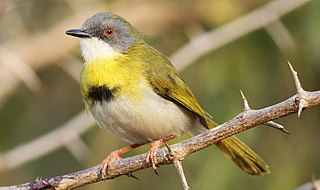Old World warblers are a large group of birds formerly grouped together in the bird family Sylviidae. They are not closely related to the New World warblers. The family held over 400 species in over 70 genera, and were the source of much taxonomic confusion. Two families were split out initially, the cisticolas into Cisticolidae and the kinglets into Regulidae. In the past ten years they have been the subject of much research and many species are now placed into other families, including the Acrocephalidae, Cettiidae, Phylloscopidae, and Megaluridae. In addition some species have been moved into existing families or have not yet had their placement fully resolved. A smaller number of warblers, together with some babblers formerly placed in the family Timaliidae and the parrotbills, are retained in a much smaller family Sylviidae.

The long-billed crombec or Cape crombec is an African warbler.

Neumann's warbler, also known as Neumann's short-tailed warbler, is a species of bird in the family Cettiidae. It is found in Democratic Republic of the Congo, Rwanda, and Uganda. Its natural habitat is subtropical or tropical moist montane forest.

The northern crombec is a species of African warbler, formerly placed in the family Sylviidae. It is found in Benin, Burkina Faso, Cameroon, Central African Republic, Chad, Democratic Republic of the Congo, Ivory Coast, Djibouti, Eritrea, Ethiopia, Gambia, Ghana, Guinea, Guinea-Bissau, Kenya, Mali, Mauritania, Niger, Nigeria, Senegal, Sierra Leone, Somalia, Sudan, Tanzania, Togo, and Uganda. Its natural habitat is dry savanna.

Sylvietta, the crombecs, is a genus of African warblers. Formerly placed in the massively paraphyletic family Sylviidae, it is now considered to belong to a newly recognized family found only in Africa, Macrosphenidae.
Chapin's crombec is an enigmatic African warbler, formerly placed in the family Sylviidae. It is currently considered a subspecies of the white-browed crombec, but might be a distinct species; too little is known about it to determine this now with reasonable certainty.

The lemon-bellied crombec is a species of African warbler, formerly placed in the family Sylviidae. It is sparsely present throughout the African tropical rainforest. Its natural habitats are subtropical or tropical moist lowland forests and subtropical or tropical moist shrubland.
The Somali crombec is a species of African warbler, formerly placed in the family Sylviidae. It is found in Ethiopia, Kenya, Somalia, and Tanzania. Its natural habitat is subtropical or tropical dry shrubland.

The white-browed crombec is a species of African warbler, formerly placed in the family Sylviidae. The enigmatic Chapin's crombec might be a distinct species, or a subspecies Sylvietta leucophrys chapini of the present species.

Philippa's crombec, also known as the short-billed crombec, is a species of African warbler, formerly placed in the family Sylviidae. It is found in Ethiopia and Somalia. Its natural habitat is dry savanna.

The red-capped crombec is a species of African warbler, formerly placed in the family Sylviidae.

The green crombec is a species of African warbler, formerly placed in the family Sylviidae. It is widespread across the African tropical rainforest. Its natural habitats are subtropical or tropical moist lowland forests and subtropical or tropical moist shrubland.

The chestnut-headed tesia is a small insectivorous songbird formerly of the "Old World warbler" family but nowadays placed in the bush warbler family (Cettiidae).

The yellow-breasted apalis is a species of bird in the family Cisticolidae.

The black-and-white shrike-flycatcher, also known as the black-and-white flycatcher or vanga flycatcher, is a species of passerine bird found in Africa. It was placed with the wattle-eyes and batises in the family Platysteiridae but is now considered to be more closely related to the helmetshrikes and woodshrikes.

Bocage's bushshrike, also known as the grey-green bushshrike, is a species of bird in the family Malaconotidae. It is scatteredly present throughout central Africa. Its natural habitats are subtropical or tropical dry forest and subtropical or tropical moist lowland forest.

The olive bushshrike is a species of bird in the family Malaconotidae. It is found in Malawi, Mozambique, South Africa, Eswatini, and Zimbabwe. Its natural habitats are subtropical or tropical dry forest, subtropical or tropical moist lowland forest, subtropical or tropical moist montane forest, and subtropical or tropical dry shrubland.

The yellow-throated bush sparrow, also known as the yellow-throated petronia, is a species of bird in the sparrow family Passeridae. It is found in south-central and southern Africa in its natural habitats of subtropical or tropical dry forests, dry savanna, and subtropical or tropical dry shrubland.
The Marquesan monarch is a species of bird in the family Monarchidae. It is endemic to French Polynesia. Its natural habitats are subtropical or tropical dry forest, subtropical or tropical moist lowland forest, and subtropical or tropical moist montane forest. It is threatened by habitat loss.

The African warblers are a newly erected family Macrosphenidae, of African songbirds. Most of the species were formerly placed in the Old World warbler family Sylviidae, although one species, the rockrunner, was placed in the babbler family, Timaliidae. A series of molecular studies of the Old World warblers and other bird families in the superfamily Sylvioidea found that the African warblers were not part of Sylviidae but were instead an early (basal) offshoot of the entire clade Sylvioidea. Some taxonomic authorities place the entire family Hyliidae here.


















